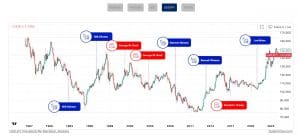Forex trading can be rewarding, but it’s easy to fall into some common pitfalls, especially when you’re new to the markets. Understanding these mistakes and learning how to avoid them can make a significant difference in your trading success. In this guide, we’ll look at some frequent forex trading mistakes and practical tips on how to steer clear of them.
1. Trading Without a Plan
One of the biggest mistakes traders make is diving into forex trading without a clear plan. Trading plans help establish your goals, define your risk tolerance, and outline your entry and exit strategies. A plan provides direction and reduces impulsive decisions, helping you trade consistently.
Solution: Develop a trading plan that includes your goals, preferred trading strategies, risk management rules, and daily routine. Stick to your plan even during market fluctuations, and adjust it only when necessary based on your trading results.
2. Ignoring Risk Management
Risk management is crucial in forex trading. Failing to manage risk can lead to significant losses that are difficult to recover from. Many new traders focus solely on profits without considering the potential downside, leading to large losses on single trades.
Solution: Follow the “1% rule” by risking no more than 1% of your trading capital per trade. Set stop-loss orders on every trade and avoid over-leveraging. Effective risk management will help protect your capital, allowing you to trade for the long term.
3. Overleveraging
Leverage can amplify profits, but it also magnifies losses. Overleveraging is one of the quickest ways to deplete your trading account. High leverage ratios can lead to rapid loss of capital if the market moves against you, especially in the volatile forex market.
Solution: Use leverage conservatively, especially when starting out. Many successful traders use lower leverage ratios to minimize risk, even if it means slower returns. Prioritize learning and consistency over big profits initially.
4. Trading Based on Emotions
Forex trading can be an emotional experience, especially when money is on the line. Common emotional pitfalls include fear of missing out (FOMO), greed, and revenge trading after a loss. Emotional trading often results in impulsive decisions that don’t align with your trading strategy.
Solution: Keep your emotions in check by sticking to your trading plan and practicing patience. Take breaks if you feel overwhelmed, and remind yourself that no trade or outcome defines your trading journey. Journaling your trades and reflecting on your emotions can also help you improve your mental discipline.
5. Overtrading
Overtrading occurs when traders open too many trades or trade excessively in a short period. This often happens when traders are chasing losses or feeling overconfident after winning streaks. Overtrading can lead to burnout, high transaction costs, and poor decision-making.
Solution: Set a limit on the number of trades you make in a day or week. Stick to high-probability setups, and avoid trading just for the sake of activity. Quality is more important than quantity in trading, so focus on finding good trades instead of trading frequently.
6. Failing to Keep a Trading Journal
Many traders neglect to keep a trading journal, missing out on valuable insights into their performance. A journal helps you track and analyze your trades, allowing you to identify patterns in your successes and failures.
Solution: Record every trade in a journal, including your rationale, entry and exit points, and how you felt before and after the trade. Review your journal regularly to learn from past trades and improve your future performance.
7. Relying Too Much on a Single Strategy
While it’s important to specialize, relying on a single strategy without adapting to changing market conditions can limit your success. Markets can shift due to economic data, geopolitical events, and other factors, so a rigid approach may not always work.
Solution: While mastering a strategy is crucial, consider diversifying your approach based on market conditions. Learn multiple strategies that suit different market environments, and stay updated on economic news and global events that impact the forex market.
8. Not Practicing on a Demo Account
Some beginners skip using a demo account, eager to start live trading immediately. This often leads to costly mistakes that could have been avoided with practice. A demo account is a risk-free way to build confidence and test strategies without financial loss.
Solution: Use a demo account for at least a few months to understand the platform and test your strategy. Treat it like real trading by setting a virtual budget similar to what you plan to invest in live trading. Transition to a live account only when you feel confident and consistent in your demo results.
Final Thoughts
Avoiding these common forex trading mistakes can greatly increase your chances of long-term success. Focus on creating a solid trading plan, practicing effective risk management, and refining your skills with a demo account. Remember, patience, discipline, and continuous learning are key to navigating the forex market confidently.




